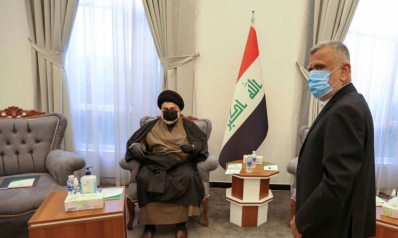Dismantling the coordination framework and isolating Al-Maliki behind Al-Sadr’s hosting of Al-Fateh leaders
Dismantling the coordination framework and isolating Al-Maliki behind Al-Sadr’s hosting of Al-Fateh leaders
12-30-2021
 BAGHDAD – The Sadrist movement’s leader Muqtada al-Sadr’s hosting on Wednesday in Najaf of a delegation from the Al-Fateh Alliance, the political arm of the militias loyal to Iran, along with the head of the Popular Mobilization Authority, Faleh al-Fayyad, raised many questions, especially since the invitation did not include the rest of the representatives of the coordination framework, especially the head of the State of Law coalition Nuri Al-Maliki.
BAGHDAD – The Sadrist movement’s leader Muqtada al-Sadr’s hosting on Wednesday in Najaf of a delegation from the Al-Fateh Alliance, the political arm of the militias loyal to Iran, along with the head of the Popular Mobilization Authority, Faleh al-Fayyad, raised many questions, especially since the invitation did not include the rest of the representatives of the coordination framework, especially the head of the State of Law coalition Nuri Al-Maliki.
The delegation of the Al-Fateh Alliance, which was received by Al-Sadr at his residence, included the President of the Alliance, Hadi Al-Amiri, and Qais Al-Khazali, the Secretary-General of Asa’ib Ahl al-Haq, one of the most hard-line factions loyal to Iran, along with Fayyad, while there were no representatives of the rest of the coordinating framework forces.
Al-Sadr’s hosting of pro-Iranian leaders in “Al-Hanana” was not without messages, perhaps the most important of which is that he wants to confirm that he is the “maestro” of the political process in Iraq, and that he will not accept competing with any party in the electoral achievement he has achieved, except according to what he determines or allows.
The end of the meeting without issuing a joint statement on the part of the two sides, and Sadr’s confinement to a tweet he posted on his Twitter account, in which he reiterated the formation of a “national majority government, neither eastern nor western”, reinforced the state of ambiguity behind the meaning of this meeting, which comes only two days after the court’s approval The Federal Supreme Court on the results of the legislative elections that were held on the tenth of last October, and led to the Sadrist movement topping the merits.
Observers believe that the Shiite leader’s hosting of a delegation from the Al-Fateh coalition seems to be the main purpose of which is to raise more doubts within the coordination framework that was formed after the elections and to include the forces rejecting the results of the entitlement, led by the State of Law coalition led by former Prime Minister Nuri al-Maliki and the pro-Iranian Conquest Alliance.
Observers believe that Al-Sadr presented during the meeting a proposal for the participation of the Al-Fateh Alliance in a government in which the Sadrist movement would form its program and control its management, a proposal that would achieve for Al-Sadr a number of goals, perhaps the most important of which is isolating his rival Nuri al-Maliki and dismantling the coordinating framework that could turn into An opposition force that causes him a lot of problems during his administration for the next stage in Iraq, as well as avoiding the risk of clashing with the militias loyal to Tehran, which, despite its announcement of its acceptance of the election results and the dispersal of the sit-in in front of the gates of the Green Zone, is unlikely to be calm.
The invitation of the leader of the Sadrist movement did not include the rest of the representatives of the coordination framework, especially the head of the State of Law coalition, Nuri al-Maliki
Observers say that the hypothesis of Al-Fateh’s acceptance of joining a government led by the Sadrist movement is not clear, as both options have positive and negative results, and perhaps one of the positive aspects of participation is to avoid clashing with the Sadrist movement, which in addition to possessing the political power that the election results enabled it to have a popular significance It is large within the Shiite community, and it also has armed militias.
Participation is also not without negative results, as it will transform the Al-Fateh alliance, which was ranked second in the last elections, to playing a secondary role in the political process, deprived of the power of decision in front of the Sadrist movement.
Hadi al-Amiri, head of the Al-Fateh Alliance, described the meeting with the leader of the Sadrist movement as positive. Al-Amiri said in a press statement that “the meeting was positive, responsible and based on the strong state’s interest and success in the next stage.”
“The discussion of guarantees of success in building the state will be completed, and in the coming days we will have a return once again to Najaf” to meet with al-Sadr, he added.
A leader in the Al-Fateh Alliance had previously suggested that Al-Sadr had invited Al-Amiri, Al-Khazali and Al-Fayyad to Najaf to “plant a time bomb within the coordinating framework”, in preparation for the dismissal of the head of the State of Law coalition.
The Rudaw media network quoted the leader, who preferred to remain anonymous, as saying that each of the three leaders would not have met at the same time in al-Sadr’s house without an “official invitation” from the latter, considering that if the decision had been issued by the coordination framework, “the representative of al-Maliki would have been within The meeting” that took place in Al-Hanana.
The source said that al-Sadr was the one who “requested to invite these three away from al-Maliki, Haider al-Abadi and Ammar al-Hakim,” because the leader of the Sadrist movement believed that al-Amiri, Khazali and al-Fayyad are “the most powerful in the coordinating framework.”
rawabetcenter.com
